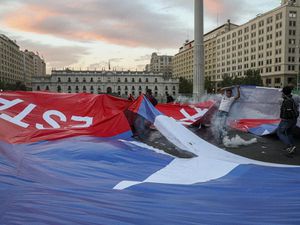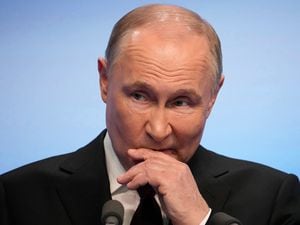Masses of Chileans jam capital in protest against government
The official crowd estimate was one million.

Hundreds of thousands of protesters have marched in Chile’s capital, intensifying pressure on a government struggling to contain deadly unrest over economic hardship.
The huge throng surged toward a central plaza on Friday as participants blew whistles, banged pots and pans and carried Chilean flags and posters demanding change.
The diverse crowd included students, workers, parents and their children.
“All of Chile is marching here,” Santiago mayor Karla Rubilar said, adding that there was hope as well as sadness among the demonstrators.
The official crowd estimate was one million, the mayor said.
“After what we saw in the streets of Santiago today, it’s hard to imagine a way forward that does not involve” the resignation of President Sebastian Pinera and new elections, said Jenny Pribble, associate professor of political science at the University of Richmond in the United States.
Mr Pinera acknowledged the huge turnout of Chileans, saying they marched peacefully to deliver a call for a fairer and more supportive country.
“We’ve all heard the message. We’ve all changed,” he tweeted.
Also on Friday, protesters tried to force their way on to the grounds of Chile’s congress, provoking an evacuation of the building.
Police fired tear gas to fend off hundreds of demonstrators on the perimeter as some politicians and administrative staff hurried out of the legislative building, which is in the port city of Valparaiso.
Earlier, truck drivers and some public transport operators went on strike around Santiago.

Thousands demonstrated in other parts of the country of 18 million people in a sign that economic concessions by Mr Pinera have failed to ease public anger.
At least 19 people have died in the turmoil that has swept the South American nation.
The unrest began as a protest over an increase in metro fares and soon morphed into a larger movement over growing inequality in one of Latin America’s wealthiest countries.
The lack of leaders and a list of clear demands in the protest movement show the shortcomings of Chile’s unpopular, discredited political parties, said Marta Lagos, head of Latinobarometro, a nonprofit survey group in Chile.
“There is a failure of the system of political parties in its ability to represent society,” Ms Lagos said.

Speaking before the huge protest in Santiago, she said she expected protesters to become more organised, and that it was unlikely that Mr Pinera, who took office last year, would resign.
The protests, Ms Lagos said, are bigger than any that occurred during the dictatorship of General Augusto Pinochet decades ago or under democratic governments that followed.
Mr Pinera served an earlier term as president, from 2010 to 2014.
Struggling to contain the strife, Mr Pinera’s administration announced increases in the minimum wage and the lowest state pensions, rolled back the metro fare increase and put a 9.2% increase in electricity prices on hold until the end of next year.
Flanked by elderly Chileans, Mr Pinera on Friday signed a measure that would raise minimum pensions, an increase that would benefit an estimated 600,000 people.
According to Chile’s human rights watchdog, more than 2,000 people have been detained and over 500 injured.
The government has declared a state of emergency and imposed curfews in 12 out of Chile’s 16 regions.





